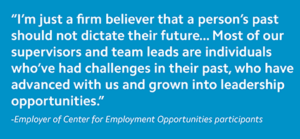Removing Barriers is Only Step 1 in Building Long-Term Economic Mobility
America celebrates Second Chance Month in April, spotlighting work to expand opportunity for people who have re-entered their communities after incarceration. Yet, at Blue Meridian Partners, we prefer to think not of “second chances” but of “fair chances,” since the stigma of past offenses may limit people’s future possibilities. Within our Justice and Mobility Fund, we ask ourselves, how can we give people with prior criminal records a fair chance to secure good jobs, access strong supports, and achieve long-term economic mobility?
Creating fair chances is at the heart of the investment strategy for the Justice and Mobility Fund, founded by Blue Meridian and the Ford Foundation with support from Charles and Lynn Schusterman Family Philanthropies. This portfolio aims to reduce entry or reentry into the justice system and mitigate its pernicious downstream effects for those already impacted. In our first two-and-a-half years, we made foundational national and state-level investments in organizations working across the spectrum of justice system involvement. The Alliance for Safety and Justice, Center for Policing Equity, Clean Slate Initiative, Vera Institute of Justice, and Center for Employment Opportunities, as well as place-based strategies in Michigan and Oklahoma, are scaling efforts to build community power, dismantle barriers to education, reduce racial disparities, reimagine a strong and equitable approach to public safety, and help justice-impacted people obtain jobs that boost their economic security.
The exemplary work of these investees sets the stage for the employment-specific direction the Justice and Mobility collaboration now pursues. Our investments prioritize three interlocking pieces of the employment puzzle:
1) removing barriers to employment;
2) building and mobilizing employer demand for hiring and advancing employees with criminal records; and
3) growing and strengthening workforce development opportunities for people exiting the justice system.
The Importance of Employment
It’s an especially urgent time to strengthen the employment landscape for individuals and communities touched by the justice system. Roughly one in three US adults has a criminal record, with Black, Latinx, and other communities of color disproportionately affected. Simply put, justice-impacted people comprise an enormous segment of America’s population that is often overlooked or barred from decent jobs. Meanwhile, demand for ready workers is at historic levels and full economic recovery is dependent on filling these roles, enabling more sectors to run at fuller capacity.
Additionally, violent crime has risen across municipalities in recent years, regardless of the size of their police budgets,. While communities struggle with public safety, research tells us that one effective deterrent to crime and recidivism is a stable, living-wage job. It’s against this backdrop that the Justice and Mobility Fund is investing in leaders whose organizations are reshaping the employment landscape for justice-impacted people in ways that will help build safer communities and a stronger, more equitable economy.

A Real Chance at a Fair Chance
The Justice and Mobility Fund provides social sector leaders with significant, flexible funds and supports to increase the pace and scale at which justice-impacted people enter the workforce. For example, we are excited about our recent investment in Jobs for the Future (JFF) to launch the Center for Justice and Economic Advancement.
JFF’s new center aims to unlock hundreds of thousands of jobs for justice-impacted people by providing tools, technical assistance, and capacity-building to employers looking to adopt Fair Chance hiring practices. Serving as a coordinated and comprehensive resource, The Center will also conduct research and build awareness of the contributors and impediments to the economic advancement of people with records, pursue advocacy, and collaborate with the Council of State Governments Justice Center to eliminate policy barriers.
We have also supported complementary policy change and advocacy efforts. For example, the National Employment Law Project (NELP) is working to dismantle barriers to mobility that the employment and criminal justice systems reinforce. An illustrative case is NELP’s campaign to remove restrictive occupational licensing requirements, which currently prohibit justice-impacted candidates from competing for jobs in a wide range of professions. NELP’s justice work sits within its larger efforts to boost economic mobility for all low-wage workers.
We also recently supported the Roberts Enterprise Development Fund (REDF) to invest in the next generation of employment social enterprises designed to help people returning from incarceration build skills, earn steady incomes, develop work histories, and stabilize their lives. Crucially, many of these ventures are directed by leaders with firsthand justice-system experience, who typically face extraordinary barriers to accessing loans or other financing. The Justice and Mobility Fund’s long-term investment will be particularly powerful in helping to scale REDF’s vision.
Enabling Justice
We are optimistic that – with the Justice and Mobility Fund’s flexible, right-sized capital – these leading organizations will generate lasting opportunity and upward economic mobility for justice-impacted people, and advance fair chances and full justice – racial, economic, and legal – in America.
Revolutionizing the social safety net
Nearly $60 billion in government benefits are left unclaimed each year by eligible people. That’s why we’re pleased that Code for America has received a significant investment from The Audacious Project, a collaborative funding initiative housed at TED. This funding, coordinated with and augmenting Blue Meridian’s initial investment, supports Code for America to reimagine the delivery of safety net benefits that help individuals and families climb the economic ladder. Through its new Safety Net Innovation Lab, Code for America will partner with 15 states to build a streamlined, accessible benefits system that reaches 13 million more people and unlocks $30 billion in food assistance, health care, and other basic needs.